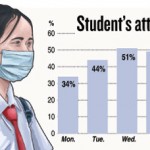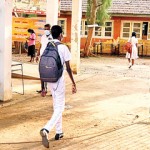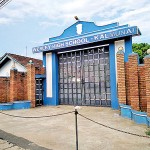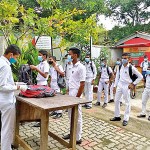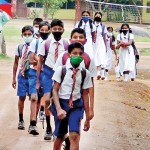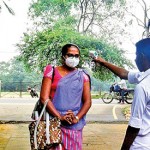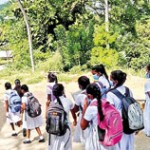News
Class bells ring with little warning, and few turn up
The government’s decision to open public schools on Monday for the final term despite the worsening pandemic came under heavy criticism by teachers, principals and parents.
They declared with one voice that the decision was sudden and that teachers and principals had not been consulted.
“[Education ministry] Secretary Professor Kapila Perera claimed the decision to reopen had been taken after consulting with relevant officials. Public health officials, grama sevaka niladharis and the police were consulted but they omitted us,” Ceylon Teachers Union Secretary Joseph Stalin said.
“No teachers or principals were called for the discussion.”
Mr. Stalin questioned the point of reopening now, saying that from next weeks there were only three weeks left before the third term ended on December 23.
- Theraputta National School Ambalantota Pic by Rahul Samantha Hettiarchchi
- Closed. A school in Kalmunai Pic by Srivelrajah Rasaiah
- Hapugala Maha Vidyalaya Galle Pic by Sirangika Lokukaravita
- Puttalam Hindu Central College. Pic by Hiran Priyankara Jayasinghe
- Dambulla National School. Pic by Kanchana Kumara Ariyadasa
- Buonavista College, Galle. Pic by Sirangika Lokukaravita
“The present system of minimising student numbers in classrooms and rotating their attendance each week gives them little study time. They get only two days a week of school, for which they have to risk their lives,” Mr. Stalin said. School administrations have been asked to halve class sizes.
Prof. Kapila Perera went on state television with Health Ministry and COVID taskforce officials to urge parents to send their children back to school, saying the decision had been taken after consultation with health officials and other authorities.
Parents, however, were not convinced and attendance in schools dropped from Monday to Friday as more cases of virus infections were reported in various provinces .
Teacher unions claimed less than 10 per cent of children attended school on Monday despite having enjoyed a two-week extension of their second term holidays due to the country’s second wave of COVID-19.
The Education Ministry claims attendance on the day was around 30 per cent, rose to 50 per cent on Tuesday and kept improving.
On Thursday, all schools in Kalmunai was closed following the detection of 22 infected people in the Ampara district. In Kandy, 45 schools were closed.
Teachers too showed reluctance to come to school as they feared that students who had family members in quarantine isolation had attended classes.
In one such incident, two children from a family of a person in isolation attended St Leonard’s Tamil Maha Vidyalaya.
In another incident, a principal of a school in the Hatton Educational Zone had travelled in a three-wheeler of which the driver was later found to have the disease. The principal is now in isolation but had attended school for two days before the infection was discovered. The school was then disinfected.
The decision to reopen schools applies to students from Grades 6-13 but the CTU said zonal directors in Walapane and Hatton were insisting that primary school teachers (Grades 1-5) also report to work. CTU Secretary V. Indraselvan said the government had not opened primary classes yet in order not to crowd school premises. “The principals are unnecessarily asking them to report to work,” Mr. Indraselvan said.
One teacher confessed that if she had a choice she would remain at home, but added: “We need the job”.
In Kurunegala, several schools in Mawathegama and Maho have been shut down after COVID cases were identified.
Schools reported lean attendance in the district. In Mawathagama Prince College only 75 students attended on Monday, 73 on Tuesday, and on Wednesday only three children showed up. The school has 600 pupils from Grades 6-11.
“At least 300 should have turned up on the rotating basis,” CTU District Secretary, Principal R.M. Ratnayake said.
In Anuradhapura district, seven schools were closed as there were fewer than 10 children attending school
It was a different situation at Anuradhapura Central College on Monday, where 514 students attended, followed by 617 on Tuesday – but then attendances dropped progressively to 552 on Wednesday, 533 on Thursday and 348 on Friday. The school has 4,200 students.
In the north, attendance was just 40 per cent. CTU president Theeban Arokiyanathan said in Jaffna, children with family members in isolation were still coming to school, creating fear among other children and teachers.
The decision to reopen schools was so sudden that school authorities had little time to prepare for it: several schools opened without carrying out any disinfection or cleaning after over six weeks’ closure.
Many schools used students to clean up premises, much to the wrath of parents.
The letters instructing schools to reopen on November 23 were only dated November 19.
Unions complained that provincial education ministries had not provided sufficient funds to maintain COVID-19 health protocols.
The education ministry announced Rs. 105 million would be spent on buying masks, sanitisers and other personal protection equipment (PPE) for schools but unions say the money has not yet been disbursed.


